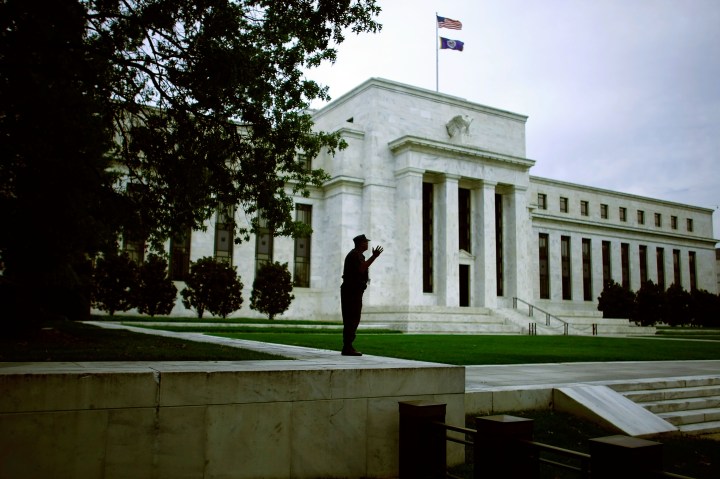
High interest rates mean anxiety for borrowers, but a “great new story” for savers
High interest rates mean anxiety for borrowers, but a “great new story” for savers

This year, banks have been tasked with figuring out student loan forgiveness alongside their clients, helping people manage mortgages amid roller coaster rates and high inflation.
Laurie Stewart, president and CEO of Sound Community Bank in Seattle and a board director of the Federal Reserve Bank of San Francisco’s Seattle branch, joined “Marketplace’s” Kai Ryssdal to talk about how rising interest rates are affecting banks and their customers. An edited transcript of their conversation is below.
Kai Ryssdal: So look, what is the banking vibe up in your neck of the woods these days?
Laurie Stewart: Well, definitely the vibe is about higher interest rates, right? And while that is troublesome for borrowers — there’s a lot of anxiety and discussion about what can I afford, whether I’m a consumer or business — you know, it’s a great new story for our savers, and especially those senior savers that have been waiting for several years to get a return on their deposits.
Ryssdal: Last time you and I spoke, we had a whole conversation about how interest rates are actually a business issue for you all, and how you have to sort of figure out what the competition is doing before you raise or lower your rates. That’s still the case, I assume, even with rates now having gone as high as they’ve gone, as fast as they’ve gone.
Stewart: Yeah, exactly. You know, the business of banking is all about the net interest margin between what you collect from your borrowers and what you pay your depositors. And that’s how we pay our staff and our investors and pay the light bill and all of those things. But we have definitely seen real uptick in demand for deposits, and so rates are very competitive now. And again, if we think about what’s happened to a mortgage loan rate, and where it’s maybe gone, maybe it’s doubled. I mean, last week, the average mortgage rate was down to 6.61%. So that’s good news.
Ryssdal: Well sure, but say that again. It’s down to 6.61%.
Stewart: This week, the mortgage rates dropped, and the average across the country was about 6.61% compared to 7.06% last week.
Ryssdal: But look, in January, it was like 3%, right? You’d get a 30-year fixed for 3%.
Stewart: That’s totally fair. Yes, it’s doubled. But the point I was gonna make is that the deposit rates have more than doubled. They’re like 1,000 times higher. You asked me about your mom’s CD last time we chatted. If she called her bank today — at least, if she called our bank today, what six months ago would have been a quarter of a percent on a six month CD is now over 3%. So that’s real money for savers.
Ryssdal: I do owe my mother a phone call. And also, she’s gonna yell at me for talking about her finances on the radio.
Stewart: Oh, OK. I’m sorry. I apologize.
Ryssdal: No, that’s all right. That’s all right. What about homebuyers walking in the door? Are you seeing demand fall as these rates have gone up? I mean, you must have, right?
Stewart: Yeah, exactly. People can afford less. You know, this is real money out of your pocket every month. But still, in our markets where we do business, inventory is still really skinny. So we haven’t seen much price change compared to what might be happening in other markets.
Ryssdal: And the same thing, sort of writ large as well. Let me ask you one more thing, and then I’ll get out of your hair and let you go back to running the bank. And I’ll caveat this by saying you’re on the advisory board for the Seattle branch of the San Francisco Fed, right?
Stewart: I’m on the board of directors of the Seattle branch, yep.
Ryssdal: OK. So with that said, I imagine you could probably, if you pulled some strings, get [Federal Reserve Chair] Jay Powell on the phone. And if you could, what would you tell him?
Stewart: Oh, you know, I’m thinking carefully here about my role on that board. Here’s what I think: I think the Fed has been very transparent about where they’re going with monetary policy. And I think they’re committed. Everything we read in that Jay Powell says he’s committed to easing inflation. And we’ve saw a modest reduction in inflation and still good consumer spending.
There’s a lot happening in the world. Through it all, Marketplace is here for you.
You rely on Marketplace to break down the world’s events and tell you how it affects you in a fact-based, approachable way. We rely on your financial support to keep making that possible.
Your donation today powers the independent journalism that you rely on. For just $5/month, you can help sustain Marketplace so we can keep reporting on the things that matter to you.











